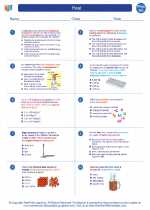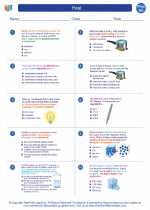Medicine
Medicine is the science and practice of diagnosing, treating, and preventing disease. It encompasses a wide range of disciplines, including anatomy, physiology, pharmacology, and pathology, and is essential for maintaining and restoring human health.
Branches of Medicine
Medicine can be divided into several major branches, including:
- Internal Medicine: Focuses on the prevention, diagnosis, and treatment of adult diseases.
- Pediatrics: Specializes in the health and medical care of infants, children, and adolescents.
- Surgery: Involves operative procedures to treat injuries, diseases, and deformities through surgical methods.
- Neurology: Deals with disorders of the nervous system.
- Cardiology: Focuses on the heart and circulatory system.
- Orthopedics: Specializes in the treatment of musculoskeletal system disorders.
Study Guide
If you are studying medicine, here are some key topics and skills to focus on:
- Anatomy and Physiology: Understanding the structure and function of the human body is essential for diagnosing and treating medical conditions.
- Pharmacology: Learning about the properties and effects of drugs, as well as their interactions with the body, is crucial for prescribing and administering medications.
- Pathology: Studying the nature and causes of diseases, including their effects on the body, is fundamental for diagnosing and treating medical conditions.
- Patient Care: Developing effective communication and interpersonal skills is important for building rapport with patients and providing compassionate care.
- Evidence-Based Practice: Understanding how to critically evaluate medical research and apply evidence-based guidelines is essential for delivering high-quality healthcare.
By mastering these key areas, you can build a strong foundation for a career in medicine and make a positive impact on the health and well-being of individuals and communities.
.◂Physics Worksheets and Study Guides High School. Heat
The resources above cover the following skills:
PHYSICAL SCIENCE (NGSS)
Energy
Students who demonstrate understanding can:
Create a computational model to calculate the change in the energy of one component in a system when the change in energy of the other component(s) and energy flows in and out of the system are known.
Develop and use models to illustrate that energy at the macroscopic scale can be accounted for as either motions of particles or energy stored in fields.



